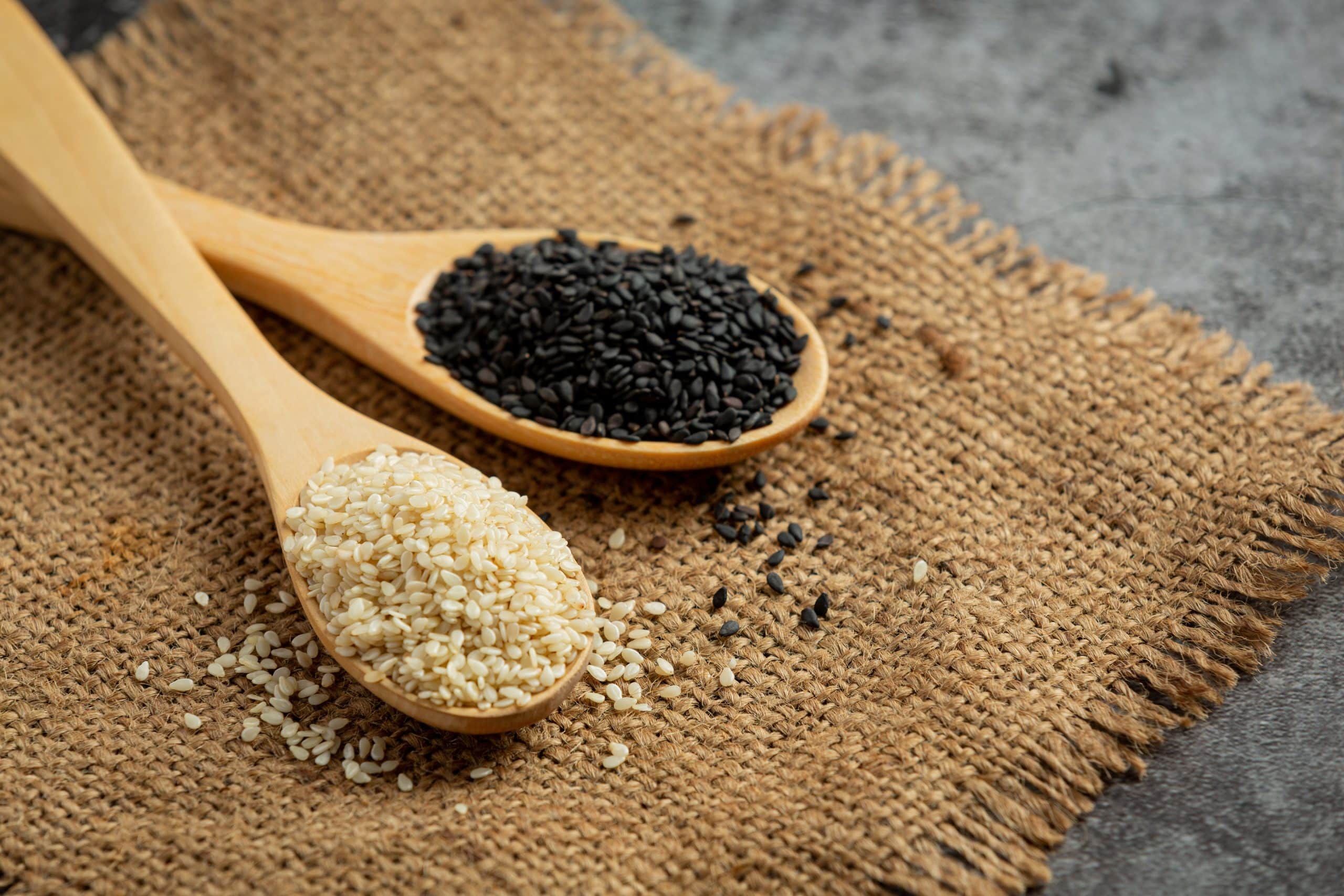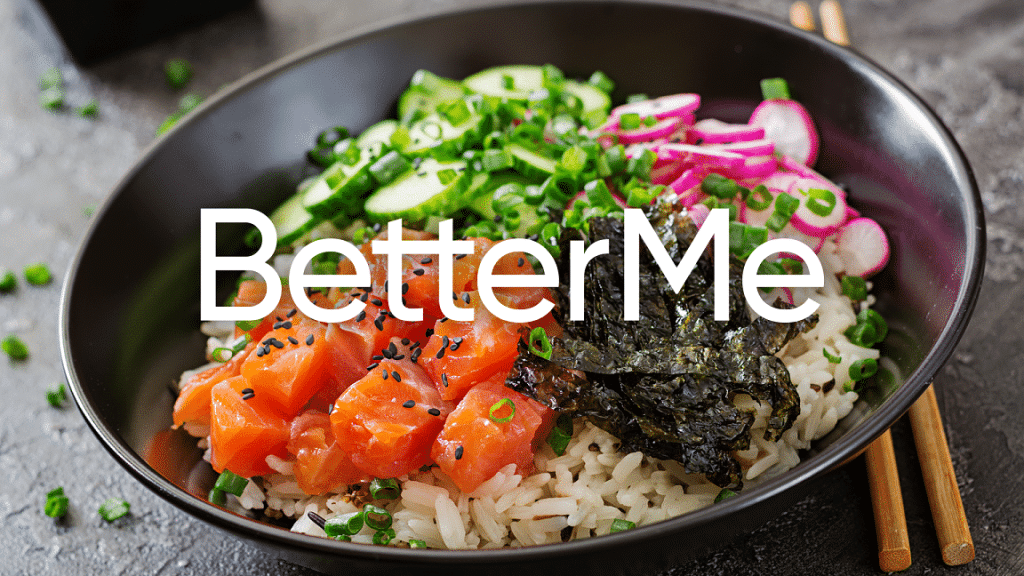Sesame Seeds, which come from the plant Sesamum indicum, are a nutritious and flavorful addition to many dishes. They can be eaten raw or cooked and added to salads, curries, sauces and dips. In some cultures sesame seeds also have medicinal uses. In India they’re used for asthma relief while in China they’re prescribed as a remedy for sore throat pain.
Get your personalized
meal plan!
Sesame seeds can be purchased whole or ground into sesame flour that is sometimes mixed with other flours such as wheat flour when baking breads and other baked goods like cookies and cakes. The oil extracted from sesame seeds is often used in cooking due to its high smoke point of about 400 degrees Fahrenheit (200 Celsius).
Sesame Seeds Nutrition Facts
One ounce (28 grams) of sesame seeds contains (23):
- Calories: 160
- Fiber: 4 grams
- Protein: 4.8 grams
- Monounsaturated fat: 5.1 grams
- Polyunsaturated fats: 6 grams
- Copper: 57% of the RDI
- Manganese: 34% of the RDI
- Magnesium: 25% of the RDI
Sesame Seeds Benefits
The benefits of eating sesame seeds include:
Digestive Health
Your digestive system needs healthy bacteria to function properly. Fiber promotes the growth of healthy gut bacteria.. The fiber content of sesame seeds can aid in digestive regularity and prevent constipation (8).
Eye Health
The seeds contain nutrients that promote healthy eyesight and protect against certain eye diseases.
- Vitamin B6: This vitamin can lower your risk for degenerative nerve disease, age-related macular degeneration, cataracts and glaucoma (24).
- Vitamin B9 (folate): This vitamin is essential to the formation of red blood cells that carry oxygen to the eyes.
- Zinc: Important for recovery from reduced vision, cataracts and macular degeneration (32).
Heart Health
Sesame seeds have been shown to reduce blood pressure by strengthening the lining of arteries which potentially reduces the risk of stroke and heart disease (1).
Additionally, sesame seeds are loaded with monounsaturated fats, which have been shown in studies to help reduce LDL or “bad” cholesterol levels while maintaining HDL or “good” cholesterol levels. This can help lower your risk for cardiovascular diseases such as atherosclerosis and coronary artery disease (4).
Skin Health
Sesame seeds contain nutrients that promote healthy skin and protect against certain skin diseases. The 2 main nutrients that promote skin health in these seeds are selenium and zinc (17).
- Selenium: This mineral works as an antioxidant to help protect the skin from UV-induced oxidative stress.
- Zinc: This mineral also protects from UV damage and exhibits antimicrobial activity, which can help with acne.
Read More: Health Benefits Of Hemp Seeds: Science-Based Facts On Nutrition, Calories And More
May Support Healthy Bones
Sesame seeds contain nutrients that promote healthy bones and protect against certain bone diseases (11)
- Calcium: This mineral is key for healthy teeth and bones.
- Magnesium: This mineral works with calcium to strengthen bones.
- Potassium: Aids in preventing bone loss which can lead to osteoporosis.
- Zinc: Aids in preventing bone loss which can lead to osteoporosis.
- Iron: This mineral plays a role in synthesizing collagen and regulating your body’s metabolism which is important for building healthy bones.
May Reduce Inflammation
Long-term, low-level inflammation may play a role in many chronic conditions, including obesity and cancer, as well as heart and kidney diseases. The seeds contain nutrients that may help reduce inflammation (3):
- Fiber: This anti-inflammatory nutrient can regulate blood sugar levels and reduce risk of some types of cancer as well as play a role in managing irritable bowel syndrome, diverticulitis and ulcerative colitis.
- Vitamin B6: Can lower inflammation levels by degrading histamine in the body.
- Omega-3 fats: Contain anti-inflammatory omega 3 fatty acids that can work to combat chronic inflammation.
May Aid Blood Cell Formation
To make red blood cells, your body needs several nutrients — including ones found in sesame seeds.
The following nutrients in sesame seeds aid in blood cell formation (12):
- Iron: Aids in making red blood cells.
- Vitamin B9 (folate) and vitamin B12: These nutrients play a role in DNA synthesis, which is necessary for the formation of new blood cells.
May Improve Nerve Function
The fatty acids found in sesame seeds make them an important part of many nerve cells.
Omega-3 fats serve as a vital component of nerve cell membranes and help maintain neuron communication. They also make up a large portion of brain tissue, where they protect neurons from damage and regulate genes involved in neuronal growth and death (14).
May Promote Thyroid Health
These seeds contain nutrients that support thyroid health:
- Selenium: This mineral plays a vital role in the synthesis of thyroid hormones (20).
- Fiber: Can keep your digestive tract healthy by working to prevent constipation. Chronic constipation is a common effect of hypothyroidism and hyperthyroidism.
- Vitamin B6: One of several deficiencies that are associated with autoimmune diseases that affect the thyroid gland, such as Graves’ disease and Hashimoto’s thyroiditis (10).
May Aid Blood Sugar Control
Sesame seeds contain nutrients that promote healthy blood sugar levels (25).
Fiber and magnesium work to improve insulin function and help regulate the metabolism of carbohydrates, fats and proteins in your body. This can also reduce symptoms of hyperglycemia such as irritability, excessive thirst and frequent urination.
May Support Healthy Lungs
Sesame seeds contain nutrients that may help promote healthy lungs.
Antioxidants, vitamin E, selenium and magnesium are essential for lung health. They work to reduce inflammation and play a protective role in the oxidative process (13).
Support Immunity
Selenium and vitamin C and protein support the function of immune system cells called lymphocytes (21) (29). They may also help reduce the risk of infections and certain cancers.
May Aid Hormone Balance During Menopause
Sesame seeds contain nutrients that can help balance hormones during menopause:
- B vitamins and magnesium: Help protect against bone loss that occurs after menopause due to the lower levels of estrogen (19, 6).
- Phytoestrogens: May reduce symptoms of hormone changes associated with menopause (26).
- Vitamin E: Can reverse age-related changes to skin, hair and nails; improve cardiovascular health; and fight inflammation.
May Promote Men’s Health
Sesame seeds contain nutrients that may promote men’s health:
- Fiber: Supports intestinal health by keeping your digestive system regular and reducing constipation, which is common in men as they age (5).
- Selenium: Can prevent oxidative damage to sperm cells and possibly protect against prostate cancer (18). Low levels of selenium have been linked to the increased risk of the disease.
- Zinc: Supports prostate health by working to reduce oxidative damage caused by free radicals (31). Prostate cancer cells have been shown to have unusually high levels of superoxide, a type of free radical.
BetterMe app is a foolproof way to go from zero to a weight loss hero in a safe and sustainable way! What are you waiting for? Start transforming your body now!
May Fight Age-Related Decline
As you get older, sesame seeds can help fight the effects of aging:
- Omega-3 fats: Reduce inflammation and slow down signs of aging caused by oxidative damage. They also help maintain muscle mass throughout the body and protect against bone loss that comes with age (15).
- Vitamin B9 (folate) and vitamin B12: These nutrients support healthy aging by possibly reducing the risk of age-related neurodegenerative diseases (27).
Sesame Seeds Side Effects
Consuming these seeds may cause the following side effects or reactions:
Allergic Reaction
Eating sesame seeds can trigger an allergic reaction in people who are sensitive to them (16).
Those who are allergic to sesame seeds may experience anaphylaxis, hives or hay fever symptoms after consuming even small amounts of the seed or its derivatives.
Sesame allergies are often confused with other food allergies but can also be mistaken for seasonal allergies since they share similar allergy-related symptoms.
If you suspect that you are allergic to sesame, consult your doctor before consuming any foods that may contain it.
People with peanut allergies are often cross-sensitive to sesame allergies. If you have both conditions, you should carry an epinephrine auto injector with you at all times for emergency self-treatment if needed.
Also, individuals with sesame allergies are also likely to report other allergies such as asthma, eczema and protein induced enterocolitis (16).
As with any change to your diet, check with your doctor before including sesame seeds as a dietary supplement. People who are allergic to sesame may experience serious side effects from even small amounts of the seed or its derivatives.
Digestive Disturbances
Consuming too many seeds can result in diarrhea and stomach cramps.
Copper Ingestion
Enjoying too many sesame seeds, especially along with other copper-rich foods and supplements, can cause you to exceed an upper limit for daily consumption of copper. High levels of copper can be toxic in adults and may even cause death (2).
Impaired Nutrient Absorption
Consuming too much sesame seed may also prohibit absorption of nutrients such as protein. This is because sesame seeds contain anti nutrients such as Trypsin Inhibitor (TIA), lectin, tannin, phytin, saponin and oxalate (7). The roasting process typically reduces or breaks down these compounds. If you are consuming sesame seeds in moderation, you shouldn’t have a problem.
Reproductive Health
Pregnant women or women who are breastfeeding should avoid eating large quantities of raw sesame seeds (22). This is because there isn’t enough reliable information to know if sesame is safe to use when pregnant or breastfeeding.
Read More: Black Sesame Seeds Benefits, Nutrition, Side Effects, And More
Hulled Vs. Unhulled Sesame Seeds
Hulling is the process of removing the seed’s hard outer shell, or hull.
Hulled seeds are often easier to digest and may even be less likely to trigger an allergic reaction.
Unhulled sesame seeds retain all their nutrients and fiber (9). The only difference is that they also contain a small amount of phytate: A compound that can reduce the absorption of iron, calcium and magnesium.
Hulled sesame seeds are also typically less expensive than unhulled varieties, so if you are trying to cut costs without sacrificing nutrition, choose hulled varieties when available.
How To Eat Sesame Seeds
Sesame seeds are a versatile addition to any diet. Here are some ways you can enjoy the rich nutrition from these seeds:
Mixed Into Other Foods
Sprinkle sesame seeds on top of salads, rice and yogurt. You can also add them to baked goods such as breads and bagels.
Ground Into Powders Or Butters
Grind raw sesame seeds into a powder that you can then use to make your own tahini sauce. Tahini is typically made with unhulled sesame seeds, so you can either roast your raw sesame seeds for approximately 10 minutes at 300 degrees Fahrenheit or toast them in a dry pan over medium heat to imitate the flavor of tahini.
Roasted Seeds
Enjoy roasted and salted sesame seeds on their own as a snack. Roasting sesame seeds brings out their flavor while also rendering them more digestible than raw varieties.
Use healthy oils when roasting sesame seeds, such as olive oil or coconut oil.
When you toast the seeds in the oven, place them on a baking sheet and roast at 300 degrees Fahrenheit for about 10 minutes or until they begin to brown just slightly.
Be mindful of how much salt you add to your roasted seeds because they already contain a small amount.
Intense sweat sessions, working weight loss tips, lip-smacking recipes come in one package with the BetterMe app. And all of it is at your fingertips, start transforming your life now!
Are Sesame Seeds Healthy?
Sesame seeds may be relatively high in fat, but most of these fats are heart-healthy polyunsaturated and monounsaturated that can help reduce cholesterol levels and lower the risk of heart disease. Additionally, sesame seeds are rich in other nutrients, including protein, thiamine and magnesium (28).
However, like most foods, these seeds are good for you when eaten in moderation. Because they are so small, it’s easy to underestimate exactly how much you eat at a sitting.
For instance, you may easily pour out a tablespoon of sesame seeds onto your salad without thinking about it. A tablespoon contains more than 100 calories and almost 4 grams of fat.
If you are trying to lose weight or avoid certain health conditions like high cholesterol, then make sure to monitor your intake of sesame seeds to ensure that you do not overindulge.
Below are some portion control tips:
- Serve a portion rather than eating from the container, which can lead to mindless overeating.
- Sprinkle them over foods containing healthy fats such as yogurt to promote satiety, or the feeling of fullness.
- Eat mindfully. Savor every bite in order to curb overeating.
- Eliminate all distractions when eating. Do not allow yourself to eat in front of the television or while reading a book, for instance.
- If you prepare your own food, make sure that you do not add too much oil when roasting sesame seeds or cooking them on the stovetop.
- Before sprinkling sesame seeds onto food, be sure to measure out a portion using an accurate food scale or measuring utensil.
- Avoid adding high calorie toppings, such as sugar or cream sauces, which can add hundreds of calories without significantly changing the flavor.
- You may also want to count sesame seeds in your daily nutritional goals if you are trying to lose weight.
The Bottom Line
Sesame seeds provide a healthy dose of protein and other nutrients, but they are also relatively high in fat. Therefore, it is best to eat them in moderation. At around 100 calories per tablespoon, sesame seeds can easily be overindulged if you don’t pay attention to how much you consume.
DISCLAIMER:
This article is intended for general informational purposes only and does not serve to address individual circumstances. It is not a substitute for professional advice or help and should not be relied on for making any kind of decision-making. Any action taken as a direct or indirect result of the information in this article is entirely at your own risk and is your sole responsibility.
BetterMe, its content staff, and its medical advisors accept no responsibility for inaccuracies, errors, misstatements, inconsistencies, or omissions and specifically disclaim any liability, loss or risk, personal, professional or otherwise, which may be incurred as a consequence, directly or indirectly, of the use and/or application of any content.
You should always seek the advice of your physician or other qualified health provider with any questions you may have regarding a medical condition or your specific situation. Never disregard professional medical advice or delay seeking it because of BetterMe content. If you suspect or think you may have a medical emergency, call your doctor.
SOURCES:
- Can sesame consumption improve blood pressure? A systematic review and meta-analysis of controlled trials (2017, onlinelibrary.wiley.com)
- Copper Toxicity (2021, ncbi.nlm.nih.gov)
- Diet and inflammation (2010, pubmed.ncbi.nlm.nih.gov)
- Dietary Fats and Cardiovascular Disease: A Presidential Advisory From the American Heart Association (2017, ahajournals.org)
- Effect of dietary fiber on constipation: A meta analysis (2012, ncbi.nlm.nih.gov)
- Effect of magnesium supplementation on women’s health and well-being (2021, sciencedirect.com)
- Effect of processing on some minerals, anti-nutrients and nutritional composition of sesame (Sesamum indicum) seed meals (2011, researcgate.net)
- Health benefits of dietary fiber (2009, academic.oup.com)
- Hulled Sesame Seeds Vs. Unhulled Sesame Seeds (2020, organicfacts.net)
- Metabolic disorders and nutritional status in autoimmune thyroid diseases (2015, pubmed.ncbi.nlm.nih.gov)
- Microelements for bone boost: the last but not the least (2017, ncbi.nlm.nih.gov)
- New insights into erythropoiesis: the roles of folate, vitamin B12, and iron (2004, pubmed.ncbi.nlm.nih.gov)
- Nutrition and lung health (2005, pubmed.ncbi.nlm.nih.gov)
- Omega-3 Fatty Acids (2021, ods.od.nih.gov)
- Omega 3 fatty acids in the elderly (2012, cambridge.org)
- Prevalence and Severity of Sesame Allergy in the United States (2019, ncbi.nlm.nih.gov)
- Role of Micronutrients in Skin Health and Function (2015, ncbi.nlm.nih.gov)
- Role of Selenium and Selenoproteins in Male Reproductive Function: A Review of Past and Present Evidences (2019, mdpi.com)
- Selected vitamins and quality of life in menopausal women (2018, ncbi.nlm.nih.gov)
- Selenium and Thyroid Disease: From Pathophysiology to Treatment (2017, hindawi.com)
- Selenium in the Immune System (2003, academic.oup.com)
- Sesame Seed – An Overview (n.d, webmd.com)
- Sesame Seeds (n.d., nutritionix.com)
- The Association of Dietary Lutein/Zeaxanthin and B Vitamins with Cataracts in the Age- Related Eye Disease Study AREDS Report No. 37 (2015, ncbi.nlm.nih.gov)
- The Effects of Sesame Consumption on Glycemic Control in Adults: A Systematic Review and Meta-Analysis of Randomized Clinical Trial (2021, hindawi.com)
- The pros and cons of plant estrogens for menopause (2014, pubmed.ncbi.nlm.nih.gov)
- The Role of B Vitamins in Preventing and Treating Cognitive Impairment and Decline (2012, academic.oup.com)
- Value addition in sesame: A perspective on bioactive components for enhancing utility and profitability (2014, ncbi.nlm.nih.gov)
- Vitamin C and Immune Function (2017, mdpi.com)
- Vitamin E and Bone Structural Changes: An Evidence-Based Review (2012, hindawi.com)
- Zinc and prostatic cancer (2014, ncbi.nlm.nih.gov)
- Zinc and the eye (2001, pubmed.ncbi.nlm.nih.gov)
















